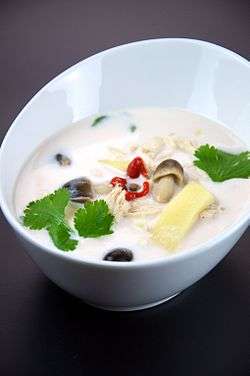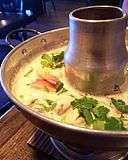Tom kha kai
 | |
| Alternative names | Chicken coconut soup, galangal soup |
|---|---|
| Type | Soup |
| Place of origin | Thailand and Laos |
| Serving temperature | hot |
| Main ingredients | Coconut milk, galangal, lemon grass, kaffir lime leaves, mushrooms and chicken |
Tom kha kai, tom kha gai, or Thai coconut soup[1][2][3] (Thai: ต้มข่าไก่, pronounced [tôm kʰàː kàj]; Lao: ຕົ້ມຂ່າໄກ່, pronounced [tôm kʰāː kāj]; literally "chicken galangal soup") is a spicy and sour hot soup with coconut milk in Thai.
Ingredients
In Thailand, most tom kha kai recipes typically include coconut milk, galangal, kaffir lime leaves, lemongrass, Thai chili peppers, coriander (or dill weed), straw mushrooms (or shiitake or other mushrooms), chicken, fish sauce, and lime juice. Fried chilies are sometimes added.
Variations
In a Thai-style tom kha kai, dill weed is not used, whereas in a Lao-style tom kha kai, dill weed (phak si, Lao: ຜັກຊີ) is used. Dill weed is a common herb which is used in Lao cuisine. The Thais' answer to dill weed (known in Thailand as phak chi Lao (Thai: ผักชีลาว), since it is known locally as a Lao herb) in Thai tom kha is coriander or cilantro (phak chi, Thai: ผักชี).
There are other versions of tom kha kai made with seafood (tom kha thale, Thai: ต้มข่าทะเล), mushrooms (tom kha het, Thai: ต้มข่าเห็ด), pork (tom kha mu, Thai: ต้มข่าหมู) and tofu (tom kha taohu, Thai: ต้มข่าเต้าหู้).
In the late 19th century, tom kha was not a soup. it was a dish of chicken or duck simmered in a light coconut broth with a generous amount of galangal. It was then served with a basic roasted chili jam as a dipping relish.[4]
Gallery
 Tom kha kai at a restaurant
Tom kha kai at a restaurant.jpg) Tom kha kai
Tom kha kai
See also
References
- ↑ Crocker, B. (2014). Betty Crocker 20 Best Slow Cooker Soup and Stew Recipes. Houghton Mifflin Harcourt.
- ↑ Tennefoss, K. (Ed.). (2010). 20 Awesome Soups You Can't Live Without. Kathleen Tennefoss.
- ↑ BF Recipes. (2008). Just Wing It: Recipes Using Pre-Baked Rotisserie Chicken. AuthorHouse.
- ↑ "ต้มข่าเป็ด จิ้มน้ำพริกเผาแบบโบราณ ; An Ancient Siamese Recipe for Tom Kha Pet – Duck Simmered in Light Coconut Cream and Young Galangal, and Served with Sour-Sweet Roasted Chili Jam". 2016-07-10. Retrieved 2016-07-11.
Further reading
- An Ancient Siamese Recipe for Tom Kha (1890 AD)
- Ayusuk, S., Siripongvutikorn, S., Thummaratwasik, P., & Usawakesmanee, W. (2009). "Effect of heat treatment on antioxidant properties of Tom-Kha paste and herbs/spices used in Tom-Kha paste". Kasetsart Journal Natural Science, 43(5), 305–312.
- Buasi, J. Joy's Thai Food Recipe Cookbook. Apornpradab Buasi.
- Sunanta, S. (October 2005). The globalization of Thai cuisine. In Canadian Council for Southeast Asian Studies Conference, York University, Toronto (pp. 1–17).